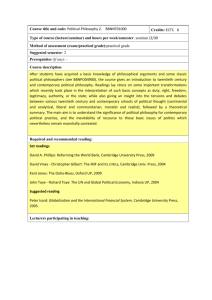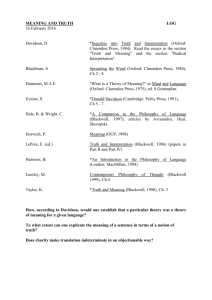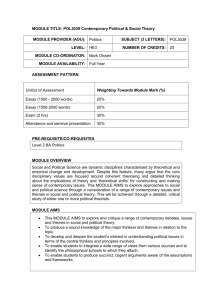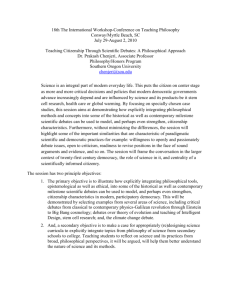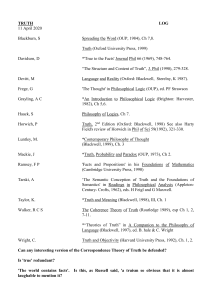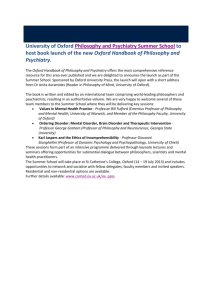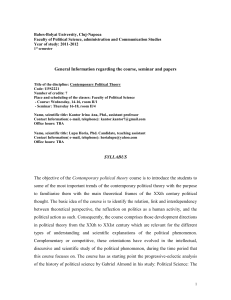Course Description
advertisement
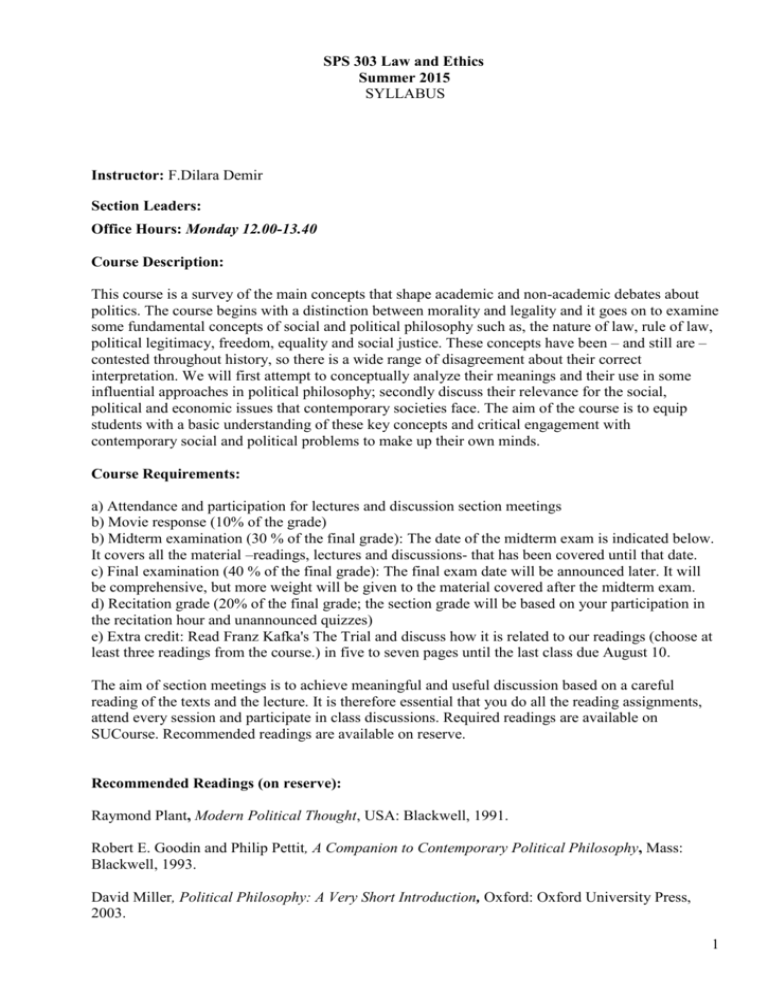
SPS 303 Law and Ethics Summer 2015 SYLLABUS Instructor: F.Dilara Demir Section Leaders: Office Hours: Monday 12.00-13.40 Course Description: This course is a survey of the main concepts that shape academic and non-academic debates about politics. The course begins with a distinction between morality and legality and it goes on to examine some fundamental concepts of social and political philosophy such as, the nature of law, rule of law, political legitimacy, freedom, equality and social justice. These concepts have been – and still are – contested throughout history, so there is a wide range of disagreement about their correct interpretation. We will first attempt to conceptually analyze their meanings and their use in some influential approaches in political philosophy; secondly discuss their relevance for the social, political and economic issues that contemporary societies face. The aim of the course is to equip students with a basic understanding of these key concepts and critical engagement with contemporary social and political problems to make up their own minds. Course Requirements: a) Attendance and participation for lectures and discussion section meetings b) Movie response (10% of the grade) b) Midterm examination (30 % of the final grade): The date of the midterm exam is indicated below. It covers all the material –readings, lectures and discussions- that has been covered until that date. c) Final examination (40 % of the final grade): The final exam date will be announced later. It will be comprehensive, but more weight will be given to the material covered after the midterm exam. d) Recitation grade (20% of the final grade; the section grade will be based on your participation in the recitation hour and unannounced quizzes) e) Extra credit: Read Franz Kafka's The Trial and discuss how it is related to our readings (choose at least three readings from the course.) in five to seven pages until the last class due August 10. The aim of section meetings is to achieve meaningful and useful discussion based on a careful reading of the texts and the lecture. It is therefore essential that you do all the reading assignments, attend every session and participate in class discussions. Required readings are available on SUCourse. Recommended readings are available on reserve. Recommended Readings (on reserve): Raymond Plant, Modern Political Thought, USA: Blackwell, 1991. Robert E. Goodin and Philip Pettit, A Companion to Contemporary Political Philosophy, Mass: Blackwell, 1993. David Miller, Political Philosophy: A Very Short Introduction, Oxford: Oxford University Press, 2003. 1 Schedule of Class Meetings June 24 Introduction – The Rosa Parks Story Movie & The Other Rosa Parks Video Clips I. Law and Morality June 29 M. L. King, “Letter from Birmingham Jail”, http://www.africa.upenn.edu/Articles_Gen/Letter_Birmingham.html H. L. A. Hart, “Law and Morals”, Concept of Law, New York: Oxford University Press, 1994. pp. 184-200. July 1 Hendrik Hartog (1985) “Pigs and Positivism” Wisconsin Law Review II. Constitution and the Rule of Law July 6 A. Goodhart, “The Rule of Law and Absolute Sovereignty”, University of Pennsylvania Law Review, Vol. 106, No. 7. (May, 1958), pp. 943-963. E. Özbudun, “The Politics of Constitution Making”, Contemporary Turkish Politics, pp. 49-69 July 8 S. Freeman, “Constitutional Democracy and the Legitimacy of Judicial Review”, Law and Philosophy, Vol. 9, No. 4 (1990 - 1991), pp. 327-370. III. Secularism and Public Life July 13 P. Weithman, “The Separation of Church and State: Some Questions for Professor Audi” Philosophy & Public Affairs, Vol. 20, No. 1 (Winter, 1991), pp. 52-65 Recommended reading: R. Audi, “The Separation of Church and Stateand the Obligations of Citizenship”, Philosophy and Public Affairs, Vol. 18, No. 3. (Summer, 1989), pp. 259-296. Etienne Balibar “Cosmopolitanism and Secularism:Working Hypotheses” Monthly Review Podcast http://mrzine.monthlyreview.org/2010/balibar110510.html IV. Freedom July 15 I. Berlin, “Two Concepts of Freedom”, Four Essays on Liberty, Oxford: Oxford University Press, 1969, pp. 121-134. J. S. Mill, Chapter 2:“Of the Liberty of thought and discussion ”, New Haven: Yale University Press, 2003. accessible online http://www.bartleby.com/130/2.html P. Pettit, Republicanism : a theory of freedom and government, New York : Oxford University Press, 1997, pp. 17-30 and 35-41. Watch the movie “It's a Free World” by Ken Loach, write a three-four page long essay on the movie and its relation to the two related readings. Deadline is due July 22nd (printed copies will be handed to the instructor in class) 2 V. Rights & Citizenship July 20 July 22 Midterm Examination J. Waldron, “Rights” in A Companion to Contemporary Political Philosophy, ed. Robert E. Goodin and Philip Pettit, Mass: Blackwell, 1993, pp. 575-583. T.H Marshall, Citizenship and Social Class, London: Pluto Press, 1992, pp. 293-316. VI. Justice and Equality July 27 J. Rawls, A Theory of Justice, New York, Oxford University Press, 1973, pp. 519532. M. Walzer, “Spheres of Justice,” in A Companion to Contemporary Political Philosophy, ed. Robert E. Goodin and Philip Pettit, Mass: Blackwell, 1993, pp. 3-30 VII. Politics of Recognition July29 VI. N. Fraser, “From Redistribution to Recognition: Dilemmas of Justice in a PostSocialist Age,” in Theorizing Multiculturalism, ed. C. Willet, Blackwell, 1998, pp. 19-49. Democracy: Aug 3 J. Habermas, “Public Sphere” in Princeton Readings in Political Philosophy, ed. M. Cohen and N. Fermon, New Jersey: Princeton University Pres, 1996, pp. 709-714. Gutmann, Amy and Thompson, D (2004). What Deliberative Democracy Means. In Why Deliberative Democracy?, Princeton University Press. pp. 1-13. Aug 5 L. Skzrypiec “Chantal Mouffe's Radical Democratic Approach to Equality” APSA 2010. J.Cohen and A.Fung “Radical Democracy” Deliberation et Action Publique pp.23-34. Accessible online: http://www.archonfung.net/papers/cohen_fung_debate_spsr2004.pdf VIII. Market Society and Economic Reason Aug 10 T. Judt, “What Is Living and What Is Dead in Social Democracy?”, The New York Review of Books, Volume 56, Number 20, December 17, 2009. A. Bugra, “Polanyi’s Concept of Double Movement and Politics in the Contemporary Market Society”, in Reading Karl Polanyi for the Twenty-First Century: Market Economy as a Political Project, ed. Ayşe Buğra and Kaan Ağartan, Palgrave Macmillan, 2007, pp. 173-186. 3
